EXPOSED: The ‘petty’ Labour policy killing morale in Britain’s forces as Starmer talks of ‘boots on the ground’ in Ukraine
Britain’s Armed Forces are experiencing several crises that would seriously impair its ability to deploy and fight
Don't Miss
Most Read
Trending on GB News
As Keir Starmer announces he is willing to put ‘boots on the ground in Ukraine’, a serving solider has slammed one of Labour’s policies that is currently tanking morale and helping fuel the retention crisis in Britain’s Armed Forces.
The Prime Minister became the first British leader to publicly float the idea of sending British forces to Ukraine since Putin’s invasion began in 2022, albeit as a ‘peacekeeping force’.
This is despite the fact Britain’s Army is projected to fall below 70,000 members this year, the smallest since the Napoleonic era, meaning the entire British Army could fit into Wembley with 20,000 seats to spare.
Starmer said he is ‘ready and willing to contribute to security guarantees to Ukraine by putting our own troops on the ground if necessary’ and that securing a lasting peace deal in Ukraine is ‘essential if we are to deter Putin from further aggression’.
 Sir Keir Starmer meets with Ukraine's President Volodymyr ZelenskyGetty
Sir Keir Starmer meets with Ukraine's President Volodymyr ZelenskyGettyBut critics like former Chief of the Army Lord Dannatt have said the UK’s forces are too small and ill-prepared to even send a force to Ukraine.
The entire Royal Navy and Royal Air Force combined employ less personnel (57,260) than the Ministry of Defence employs civil servants (63,702), for example.
These shocking numbers, which seriously undermine the PM’s sabre rattling, are the result of a retention crisis that has been engulfing the forces for over a decade.
GB News has spoken to a serving soldier and his wife about the critical problems driving people to leave Britain’s forces, namely Reeves’ inheritance tax changes.
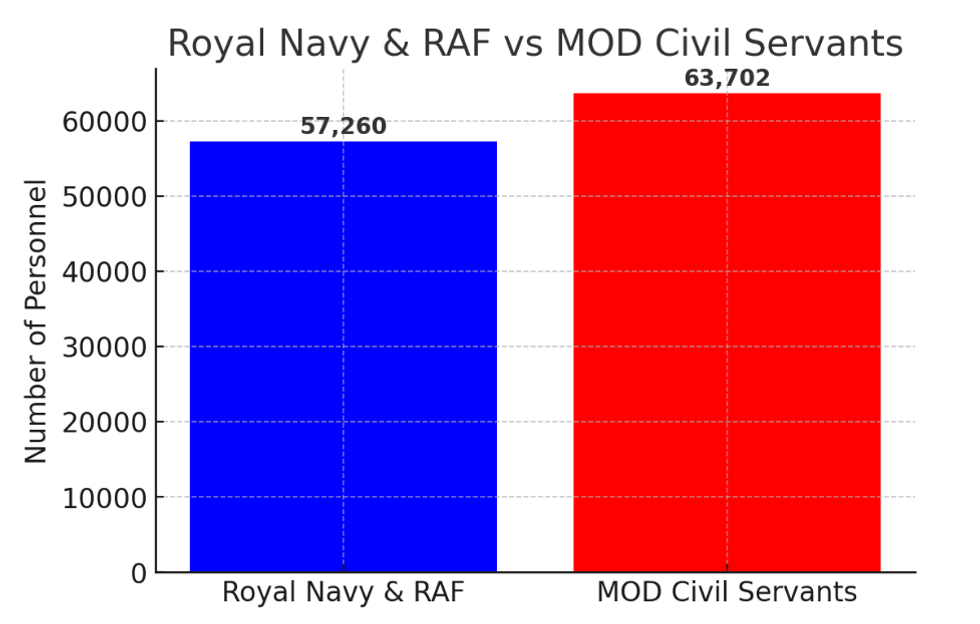
Size of Navy and RAF v MoD civil servants
GBN
Inheritance tax on death in service payments
Currently, if a death occurs in service the families of the deceased receive tax-free lump sums as compensation for the loss of a family member.
But under changes voted through by Labour these payments will be taxed from April 2027.
There are exceptions. Death duties will only kick in if the serviceman or woman dies while ‘off duty’, which could include illness or accident.
It will also only apply to payments being made to the family of un-married servicemen and women.
However, the tinkering of such a crucial support for military families, which will save little money for the Treasury, drew heavy criticism from GB News’ source.
A military wife- who cannot be identified for security reasons- said: “It is broadly petty, as it will raise little money, disingenuous, as it undermines the military covenant (not to disadvantage service personnel) and foolish, as is further damages the confidence of service personnel in a time of a national recruiting and retention crisis.
“Once again, the policies of this government have probably been put forward by civil servants and a political class who do not understand the military and their way of life.
“Cutting this benefit, which is ‘low hanging fruit’, makes a fine distinction between dying ‘on’ or ‘off duty’.
“It does not reflect that service personnel are always on duty and are paid 24/7 and 365 days per year.
“You might be on leave or stood down, but you could and are regularly called back to duty at a moment's notice, particularly in times of national emergencies from wars to pandemics and floods!
“Who was called upon to cover the fireman’s strikes? Service personnel don’t have the choice to not return to work and may be required to cancel holidays or return from them immediately, which is often enforced, and we have personally experienced.
“So the distinction is technical and again mean spirited from a Labour party that purports to represent workers' rights.”
Death in service payments- usually four times the deceased’s salary- are tax free, but under Labour’s crackdown could be taxed by up to 40 per cent.
GB News took the salaries of different ranks in the British Army, multiplied them by four and then subtracted 40 per cent for IHT to get an idea of the financial implications of this policy. (All salaries are starting salaries taken from British Army website).
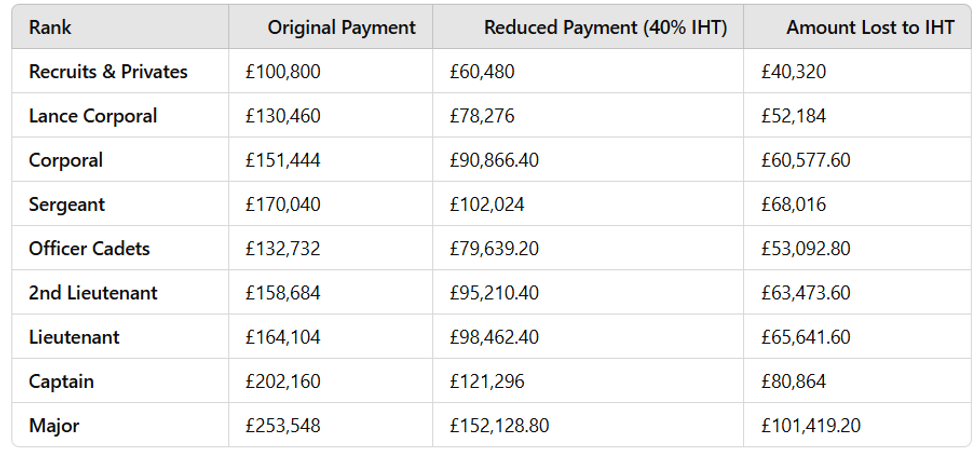
How much different ranks in the Army could lose if their death in service payments were taxed
GBN
It shows for a Lance Corporal earning a salary of £32,000, his family would have been paid £128,000 in the event of his death, but will now receive £78,276, a loss of £52,184 to the Treasury.
For a deceased Second Lieutenant, his family would have received a £158,684 payment, but will now receive £95,210.40, a loss of £63,473.60 to the Treasury.
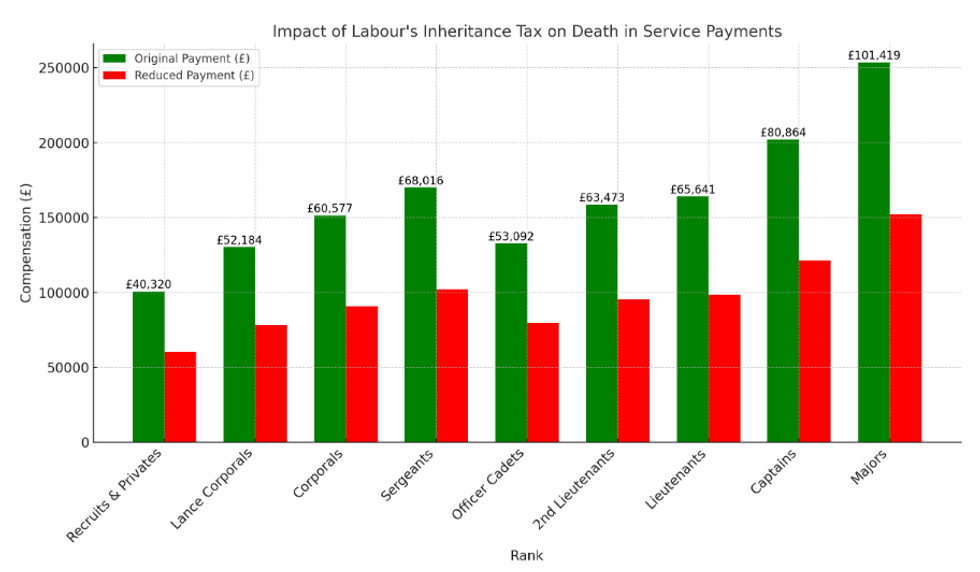
How much different ranks in the Army could lose if their death in service payments were taxed
GBN
GB News’ military source continued: “Could you imagine this being part of the deal with the rail industry or the NHS? No.
“Service personnel do not have the right to strike or object to any changes in conditions of service and defence is again an easy target for savings.
“More importantly, to be so mean spirited to the families and dependants of personnel who have served their country and died in service (but happen to be off duty) fails to understand the moral component of maintaining an armed service with people who are willing to sacrifice everything for the nation.
“The understanding that your dependants will be looked after no matter how you die or where you die is a huge factor in attracting and retaining people who are willing to serve.
“Making it more contractual and dependent on circumstances starts to unravel all of that and what it represents.
“It makes me think that this is just a cynical method of saving money with a reckless regard for consequences of the defence of our nation.”
“This will enforce poor morale in the forces and result in further loss of personnel in a time of increasing geopolitical tensions.
“We do not have a Union to disrupt and to support personnel and their only option is to show their dismay by leaving and they are.”
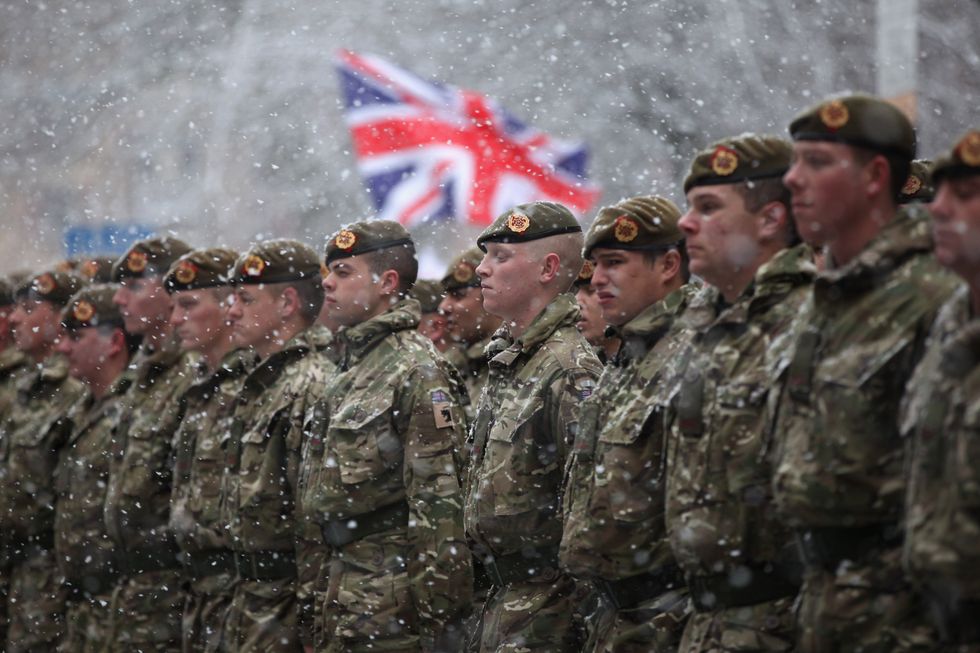
The UK's Armed Forces have been 'hollowed out', according to top army chiefs
GETTYIt comes after Labour faced heavy criticism for decisions that would disproportionately affect military families at a time of increased tensions and a dwindling army.
Subjecting private schools to VAT has been singled out as another example of Labour betraying the Armed Forces’ Covenant that no military family will be left behind because of their service.
Currently, the MoD will pay up to 90 per cent of boarding school fees for children of serving personnel as their parents are required to move around the world every few years.
The constant upheaval would seriously impair a child’s educational outcomes, let alone their emotional development as their relationships with other children and teachers is constantly broken.
Subsidising boarding school fees is a key way to keep people in the forces when they decide to have children. It is also a major incentive to join in the first place as many boarding schools offer excellent education and extra-curricular activities.
But Labour’s VAT raid has forced many independent schools to raise fees by 20 per cent.
When military families protested this would hit them disproportionately, Labour announced it would increase subsidies in turn, but the cap of 90 per cent would remain.
However, the remaining ten per cent army families have to pay will still rise significantly as it is now ten per cent of a much larger number.
Eton, for example, raised its fees from £52,749 to about £63,000 a year to account for the VAT raid.
This means it cost military families £5,274 (10 per cent of £52,749) to send their child to Eton before the measure, but it now costs them £6,300, a rise of £1,026.
There are many complexities involved the MoD’s updated subsidies for boarding school fees and a wide-ranging survey is currently underway by the Army Families Federation.
For a family with two children, this equates to £2,052 a year which for a solider earning £30,000 a year will be unaffordable.
LATEST FROM MEMBERSHIP:
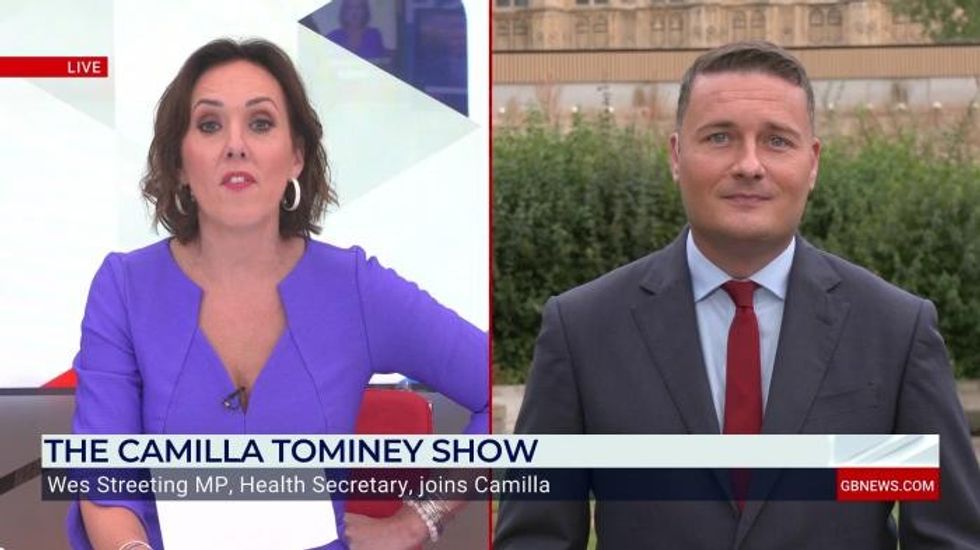 VAT on private school fees are 'not a surprise', declares Wes StreetingGB News
VAT on private school fees are 'not a surprise', declares Wes StreetingGB NewsIt comes as the Prime Minister faces intense pressure to increase defence spending to 2.5 per cent of GDP as the US moves to scale back its investment in the defence of Europe.
Starmer, who has already committed £3billion of aid to Ukraine every year to 2030, has said he will increase defence spending to 2.5 per cent of GDP but has not set a deadline.
Former Defence Secretary Ben Wallace believes only a 3 per cent rise will keep the US in NATO.
A Treasury spokesperson said: “We value the immense sacrifice made by our brave Armed Forces, which is why existing inheritance tax exemptions will continue to apply, meaning that if a member of the Armed Forces dies from a wound inflicted, accident occurring or disease contracted on active service, they will be exempt.
“Estates of service personnel will also still be able to pass on up to £1 million with no inheritance tax liability under existing nil-rate bands, reliefs, and exemptions available.”
GB News asked to clarify position on death in service payments and is awaiting a response.
An MoD spokesman said: “The Strategic Defence Review is wide-ranging, ensuring we look hard at the threats we face and the capabilities we need to meet the challenges and opportunities of the 21st century.”
“To ensure the UK is prepared to deal with the changing threat, our Budget increased defence spending by £2.9 billion for next year and we are committed to setting a path to 2.5 per cent of GDP on defence in spring.”







